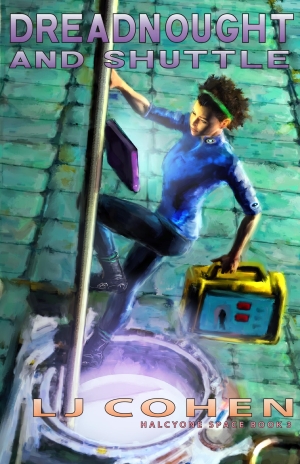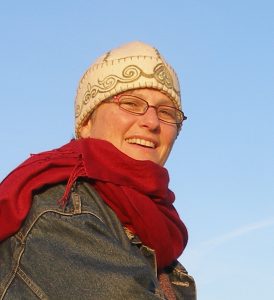6.8.16 Guest author L.J. Cohen: Integrating her past with a novel future
I met L.J. Cohen when we were placed alongside one another at a convention reading; we bonded pretty much immediately. Aside from being a cheery, intelligent woman, she has tons of savvy about the self-pub writing business (and has had impressive success with her Halcyone Space series!) a delightful sense of humor, a passion for Doctor Who and an amazing head of silver hair. I am lucky to call her a friend.
With the release of the third book in her Halcyone Space series, Dreadnought and Shuttle, she’s making the rounds of other writers’ blogs and it is my pleasure to share her thoughts with you about making the transition into authorhood (and finding a way to make her other expertise useful in her books). Plus, we’re giving away a free e-book from her list of works, chosen randomly from anyone who leaves a comment at the bottom before June 16!
From here, it’s all L.J. Take it away!
Sometimes I think I have two distinct identities: Lisa Cohen, physical therapist, and LJ Cohen, speculative fiction writer. Of course, there is overlap; after all, I’m the same person, despite a minor difference in working name. But if you would have asked me how working as a PT for nearly 25 years was related at all to my second career as a novelist, my answer would have been a shrug.
It seemed like I had buried my desire to be a fiction writer beneath my need to study and advance a career that had chosen me as much as I had chosen it. I started college planning to study a pre-med curriculum. Partly, that was due to pressure from my parents to have a prestigious and financially stable career and partly due to my own fascination with anatomy and physiology. Plus, my parents had made it abundantly clear that becoming a writer was not a goal they would support and since they were paying for college, I didn’t have a lot of power in that decision.
During freshman year, I discovered that organic chemistry and I were not compatible. I withdrew from the class before I could fail it and foundered for a bit knowing that I had been ‘weeded out’ of the pre-med field. Then, in my sophomore year, I tore up the ligaments of my right knee skiing and discovered physical therapy through my own six month course of rehabilitation. In an ironic twist, I discovered I would need to retake and pass organic chemistry in order to apply for PT school, which I did, and earned my masters degree in 1986. For the next two decades, I worked as a clinician, specializing in orthopedics and chronic pain management. All the while, my love of story and writing got subsumed by reams of patient notes, research papers, and textbook chapters.
 It wasn’t until 2004 that I returned to the fiction I had left behind in my teens and twenties. I decided that at age 40, with two young children and a burgeoning PT practice, I would also write a novel. A year later, I had finished a rambling, incoherent, bloated manuscript. The next year, I wrote another. Ditto for the year after that.
It wasn’t until 2004 that I returned to the fiction I had left behind in my teens and twenties. I decided that at age 40, with two young children and a burgeoning PT practice, I would also write a novel. A year later, I had finished a rambling, incoherent, bloated manuscript. The next year, I wrote another. Ditto for the year after that.
Between 2005 and 2016 I completed 11 novels, signed with (and ultimately left) a literary agent, left my PT practice, created a publishing imprint, and published 6 novels. Finally, now that I’m not actively practicing physical therapy, I can see the relationship between my two careers. And it exists on several levels.
First, because I created and nurtured a private PT practice, I was no stranger to entrepreneurship when I started considering indie publishing. I already understood the pros and cons of starting a business solo. Yes, you retain the creative control, but you also end up wearing multiple hats and carrying all the responsibility.
And second, more directly, I realized that nearly every story I’ve written incorporates some aspect of my fascination with anatomy, physiology, neuroscience, and healing.
The following examples from Dreadnought and Shuttle illustrate some of the ways I use my physical therapy background in my speculative fiction writing.
Micah has significant burns on both his feet that he sustained as part of a larger trauma. It is recent enough and associated with enough loss that its effects have impacted him both physically and psychologically, as illustrated in this exchange with his new roommate:
By the time he hobbled to his room, Micah’s world had narrowed to the blood pulsing in his feet and a surging anger. …
“I’m fine.” Micah’s response was sharper than he’d intended. He shook his head and opened his eyes. “Just walked a little too far.”
“You didn’t say how your feet got burned.” Dev tilted her head, waiting.
Micah stared past her, seeing Halcyone’s storage bay filled with crates of illegal military-grade weapons under forged diplomatic seals. The memory of the shock-cuffs restraining his hands and feet was never very far away. His palms were slick with sweat. “You’re right.”
Jem is struggling to function after a head injury and the implantation of a neural device that doesn’t fully work. It was important to be able to describe his experience of interacting with his own damaged brain and the tech.
Jem kept his eyes open and unblinking. The light seared his vision. It didn’t take long before the nystagmus started.
Instead of closing his eyes and looking away, Jem let the pressure build and focused on imagining the waves of excitation and inhibition rippling across his visual cortex. He dropped into the relaxed-ready-for-input state that Dr. Land’s aftercare exercises had taught him. They created the best conditions for the nanoemitters to transmit, but rather than trying to link with his micro, Jem focused on the chaotic signal his brain was producing and fed it back to its source.
His heartbeat deepened. Time expanded. He knew his eyes were still open, but the colors and lines of the display had vanished until all he saw was a pulsing blur. At first, there was no structure or pattern to it, reflecting his panicked response to the terrible vertigo that had ruled his life for far too long.
Dr. Land had been honest with him. There was a good chance Jem’s mind would never fully integrate the emitters and the receiver into a functioning neural. Pushing the fear aside, Jem focused on his breath and the mental exercises.
A distant part of him was aware of Ro standing beside him. Her worry was a palpable thing, but it didn’t belong to him. Jem’s whole world shrank to the motion and intensity of the light. Slowly, a perfect circle softened in front of him. It was like watching an eclipse expand across his visual field, but instead of swallowing everything in its penumbra, it left the light behind, only taking all the harshness with it. His eyes relaxed. The rhythm of his near constant headache stuttered and stopped.
Lieutenant Commander Gutierrez is a formidable soldier and uses her prosthesis to intimidate.
“Maldonado.”
Ro jerked her head up and stopped short, nearly walking into Gutierrez. Her micro slipped from her hands and tumbled to the floor. Cursing, Ro crouched to pick it up. The LC knelt down beside her and placed her prosthetic claw on top of Ro’s hand. The cold metal pressed down, pinning Ro in place.
“Let go.” Ro had seen Gutierrez handle delicate instruments, exerting only the exact degree of force needed to keep them stable. That arm could also crush the bones in Ro’s hand without much effort. Members of the crew passed them by without a glance, but the longer the two of them remained there, the more notice they would attract.
The LC shifted her artificial grip to Ro’s wrist and pried her hand aside with deceptive ease. Gutierrez’s intact hand palmed the micro. It seemed like minutes, but it was only a few seconds before she released Ro and stood, holding the small device just out of reach. “I believe you dropped something.”
“I believe you’re threatening me.” Though even if she could prove it, reporting the LC would only increase Commonwealth scrutiny on all of them. Surely, Gutierrez didn’t want that.
“Have you had lunch yet?” Gutierrez asked, slipping Ro’s micro into her pocket.
“What?” Ro rubbed her wrist. The prosthetic hadn’t even left a mark.
In each case, it was important that I represented injury, pain, and function in a realistic fashion. One of my pet peeves in fiction is the way bodies take damage with very little consequence, or consequences of convenience. The expression of an injury shouldn’t function solely as a plot point, used and then discarded, but needs to serve a larger purpose in terms of overall story, characterization, and stakes. Having a background in rehabilitation, anatomy, and physiology helps me add a degree of realism to the story, essential even if I’m telling a tale of sentient space ships, plasma weapons, and worm hole travel.
And it finally allows me to integrate my past into my future.
Learn more about LJ Cohen and her writing at these locations:
Homepage: http://www.ljcohen.net/
Blog: http://ljcbluemuse.blogspot.
Newsletter: http://www.ljcohen.net/
Google+: https://www.google.com/+
Goodreads: https://www.goodreads.com/
Facebook: http://www.facebook.com/
Twitter: @lisajanicecohen
Amazon Author page: http://www.amazon.com/-/e/
Don’t forget to leave a comment to be eligible to win one of LJ’s books!
xo,
R
Like what you’re reading? Donate here!
[paypal-donation]

These guest posts are very interesting. I like that each one hits a different aspect of LJ Cohen’s personality and experience. This particular aspect of early career choice is especially interesting to me, because I’m another one of those who began with an eye toward being a doctor and ended up in another medical field. We have in common that we both passed organic chemistry, too.
I’m about a third into the latest book and am enjoying it immensely.
Thanks, Anita. I think organic chemistry is evil and exists to make undergraduates miserable. 🙂
Maybe it weeds out the weak ;D
The medical knowledge you brought to the story made the characters and situations feel extremely real to me. I think it’s a major part of why the books were so engaging! Without consequences there is little conflict, without conflict there is little opportunity for growth
Thank you! And I agree – every choice an author makes in a story is a conscious one and needs to have a reason to be on the page, along with consequences. It’s one of the reasons I dislike how much of injury and disability is portrayed in stories. It’s often used as a trait of convenience, most commonly to motivate the protagonist.